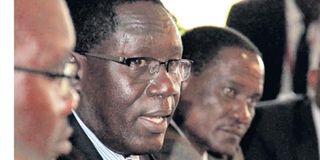Safaricom to pay Sh6bn for 4G

Communications Authority of Kenya director-general Francis Wangusi Thursday when he appeared before the Parliamentary National Security Committee in Nairobi. The committee is investigating the security contract awarded to Safaricom. PHOTO | DIANA NGILA
What you need to know:
- The firm has inked a deal that will see it set up a national security surveillance system to be repaid partly by allocation of a 4G spectrum and the rest converted to a loan payable from 2016.
Mobile phone service firm, Safaricom will pay Sh6.45 billion to have its application for a new spectrum approved.
According to the Communications Authority of Kenya director-general, Mr Francis Wangusi, this is only a tentative price and when the final price for the 4G spectrum is determined, the telecommunication firm will be required to pay the difference if it is more than the Sh6.45 billion ($75 million).
Mr Wangusi appeared before the Parliamentary National Security and Administration Committee and noted that this was one of the conditions if Safaricom is to get the spectrum in exchange for setting up the security surveillance system.
The firm has inked a deal that will see it set up a national security surveillance system to be repaid partly by allocation of a 4G spectrum and the rest converted to a loan payable from 2016.
Asked by the committee whether the commission had been pressured by the government to give Safaricom the extra spectrum, Mr Wangusi said it was not the case. The agreement between the Interior ministry and Safaricom has not yet been finalised.
“After they finalise the agreement, they’ll then apply for the spectrum and the normal procedure will be followed. If they satisfy the conditions and we are satisfied, the board will make its decision,” he said.
The director said the government approached commission after dealing with Safaricom and they wanted to find out if the spectrum to the company would be used to pay some of the costs of starting the surveillance system.
He said to avoid distorting the market, the commission would ensure that a certain percentage of the capacity Safaricom build in the long-term evolution system would be shared with other service providers.
Mr Wangusi told the committee that they had stated that the network for the police must be independent of Safaricom’s commercial enterprise and must be used exclusively by the police.
Only the passive infrastructure — the physical transmission masts and generators — would be shared with the police.





